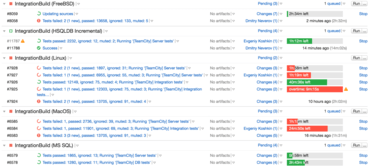Offizieller Lieferant
Als offizieller und autorisierter Distributor beliefern wir Sie mit legitimen Lizenzen direkt von mehr als 200 Softwareherstellern.
Sehen Sie alle unsere Marken.
Improved Building and Testing:
Improved Perforce integration:
Hardening the security of your CI:
Improved configurability:
Improved availability:
Improved Sakura UI:

Eine Lösung für die kontinuierliche Integration und das Build-Management.
Live-Chat mit unseren JetBrains-Lizenzierungs-Spezialisten.